Top 7 MBA Subjects You Need to Know in 2025
Table of Contents

Do you see yourself as a figurehead in the future? Is a career change or a master’s degree something you need?
Once just a luxury, an MBA has evolved into a necessity for those who desire to advance in their careers in today’s competitive job market.
Whether you are just beginning your academic career or looking to gain that extra cutting-edge experience in your occupation, you’ll find key MBA subjects that will put you on the right post ahead. Search through MBA subjects in India below and plunge into the details of an immersive learning experience!
MBA Subjects Overview
-
- Core MBA Subjects in Inida are mandatory classes that provide a strong foundation in business principles.
- MBA Specialization Subjects classes that are customized to a specific business domain help students understand and master those areas in marketing, finance, or entrepreneurship.
- Elective Subjects courses that students can take at their discretion to explore specific interests or industries, or in-depth study in a particular area.
MBA 1st Year Subjects
Here’s the breakdown of the MBA 1st year subjects according to semester, which is tabulated below:
The core papers to be offered in the first semester are introductory MBA subject lists to business.
| Semester-1 | Semester-2 |
|---|---|
| 1. Financial Accounting | 1. Financial Management |
| 2. Marketing Management | 2. Operations Management |
| 3. Organizational Behavior | 3. Business Economics |
| 4. Business Communication | 4. Human Resource Management (HRM) |
| 5. Strategic Management | 5 . Business Statistics |
| 6. Managerial Economics | 6. Legal Aspects of Business |
| 7 . Quantitative Techniques | 7. Information Technology for Management |
| 8. Managerial Accounting | 8. Leadership and Team Building |
| 9. Business Environment | 9. Consumer Behavior |
| 10. Managerial Communication | 10. International Business |
1. Semester 1: Core Foundation Subjects
- Financial Accounting: Understand those basic MBA subjects in accounting principles, financial statements, and their role in decision-making in a business context.
- Marketing Management: The principle of marketing to market segmentation and product placement comes under the MBA subjects lists.
- Organizational Behavior deals with weak and strong employees, leaders, or not-groups or within groups, concentrating on leadership and team dynamics and power relationship problems.
- Business Communication: It is best learned through different means of speaking and writing, especially in a business environment.
- Business Statistics: Understanding uses are elementary statistical methods conducted on business data.
- Managerial Economics: Business decisions and practices in which microeconomic views are embodied in any organizational decision, such as the choice of plant, the advent of a new product, marketing, or balance sheet matters.
- Quantitative Techniques: This MBA subjects in India covers the theoretical backgrounds of one’s models, with probability and pretty low spacing between models.
2. Semester 2: Advanced Management Subjects
The second semester act as a bridge, from the concepts presented and learned in the first semester to MBA specialization subjects in various areas such as finance, human resources, and strategic management within management.
- Financial Management: The art and science of making financial decisions, management theory extended to capital budgeting, capital structure, and the management, or rather a mitigation, of risk.
- Operations Management: Management of the supply chain, whether it is in terms of material flow, production planning, inventory, or electromechanical devices.
- Business Economics: Macroeconomic views, market structures, and business application economics of different markets or applications to be studied in MBA subjects.
- Human Resource Management (HRM): Recruitment and employee performance management will all be included in this, as will operational aspects of the interaction between administration and human resources.
- Strategic Management: Development, implementation, and review of business strategies.
- Legal Aspects of Business: The range of rights and duties between parties that are enforceable under the law. The study will be only on the basic concepts of contracts, intellectual property, labor relations, and regulation in business.
- Information Technology for Management: Another aspect of the meaning is that it depicts technology’s use by managers in their decision-making and operation execution.
- Managerial Accounting: Application of the principles of financial accounting to business problems including decision-use of accounting information, strategic planning control, and cost management.
- Consumer Behavior: The development of models that explain how and why consumers make the decisions they do and how companies can integrate them into their cycles of producing goods.
- International Business: Operation worldwide, together with the management of it in syncretic organizations and international trade.
3. Key skills developed during the first year
Helping lead people keeps the changes in their lives to a minimum, but leaders sometimes change at a time when they may be feeling stressed. The best leaders keep command by autonomy in decision-making.
By the end of the MBA 1st year subjects, you will be skilled in the below-depicted diagram:
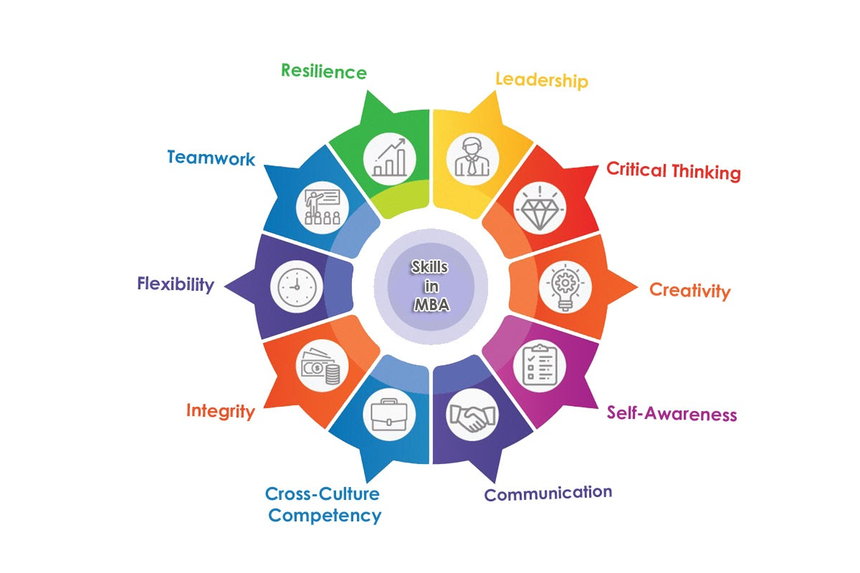
MBA Subjects in India
Let’s dive into the exciting world of pursuing an MBA in India! Are you considering an MBA but feeling unsure or overwhelmed with some questions?
An MBA subjects in India are competitive, engineered, and designed to bestow every student with knowledge and competencies to succeed in the fast-paced world business environment. Being in finance, marketing, HR, or operations, there is a great scope of learning that is very practical, varied, and pertinent to today’s dynamic job market.
Exactly how significant to you are all those core and elective classes while taking stock of the business landscape as a manager, entrepreneur, or consultant? This is the same question that keeps much-needed focus on the MBA subjects list track for students.
1. Key Subjects in an Indian MBA - Main and Elective Courses
- Core MBA Subjects
-
- Financial Accounting– Master the business lingo as provided by balance sheets, income statements, and cash flow.
- Marketing Management– This subject helps you understand constructing strategies to promote products and get in touch with customers.
- Organizational Behavior—Learn what behaviors people have in organizations and how they affect performance due to leadership and culture.
- Business Communication– The art in practice or mastery in written, spoken, or negotiation of doing business.
- Managerial Economics– This involves analyzing economic principles and their applications in business decision-making processes.
- MBA Specializations subjects in India
-
- Finance: This specialization offers courses that go deep into financial management, investment analysis, and corporate finance.
- Marketing: Courses participants learn advanced strategies in digital marketing, consumer behavior, and brand management.
- HR: People in the HR preference need courses to understand organizational behavior, recruitment management, training, and talent management.
- Operations: Efficiency is achieved in doing business with a healthy supply chain and logistics.
- International Business: Trading worldwide is what this specialization involves, as well as cross-cultural management and international strategies.
- Elective MBA Subjects in India
-
- Entrepreneurship: Learn everything about building and running your own business. From transforming an idea into reality to executing and managing operations, master the art of entrepreneurship.
- Data Analytics: Discover the power of data and how it drives smarter business decisions. Gain insights into analyzing trends, making predictions, and solving real-world problems using data.
- Business Strategy: Develop the skills to craft long-term strategies that fuel growth and profitability. Learn to navigate competitive landscapes and position your business for sustainable success.
- Supply Chain Management: Master the art of managing logistics, procurement, and inventory. Understand how to optimize supply chains to enhance efficiency and meet customer demands. Even such a broad topic as Business ethics is embedded in understanding Corporate Social Responsibility (CSR) as the basis for good governance.
- Real-life application: Amazon, Google, Tata Group and experience the tangible nation of these strategies.
2. Differences between MBA programs in India and abroad
| Aspect | MBA in India | MBA Abroad |
|---|---|---|
| Duration | 2 years for online programs (4 semesters) | 1 year (in the UK, Europe) or 2 years (US, other countries) |
| Curriculum Focus | Emphasizes core business functions (Marketing, Finance, HR, Operations) | More diverse, including international business, and specialized electives (e.g., entrepreneurship, data analytics) |
| Teaching Methodology | Primarily lectures, case studies, and exams | Interactive learning, case studies, group projects, global exposure |
| Cost of Education | Lower fees | Higher fees |
| Living Expenses | Relatively lower cost of living (depends on location) | Higher cost of living (in cities like London, New York, etc.) |
| Admissions Criteria | Entrance exams like CAT (Common Admission Test), GD/PI, and academic performance | Entrance exams like GMAT/GRE, work experience, essays, and interviews |
| Work Experience Requirement | Generally 2-3 years of work experience in some programs | Typically requires 2-5 years of work experience (especially for full-time MBA) |
Detailed MBA Subjects List
Do you want to learn about business management or consider getting an MBA for a career?
Indeed, one must know the value of the different MBA subjects list that can be studied in this course. Along the way, core subjects remain within the MBA curriculum; however, courses on such subjects as elective specializations now support your career objective.
So come on down! We’d like to know which MBA specialization subjects interest you the most.
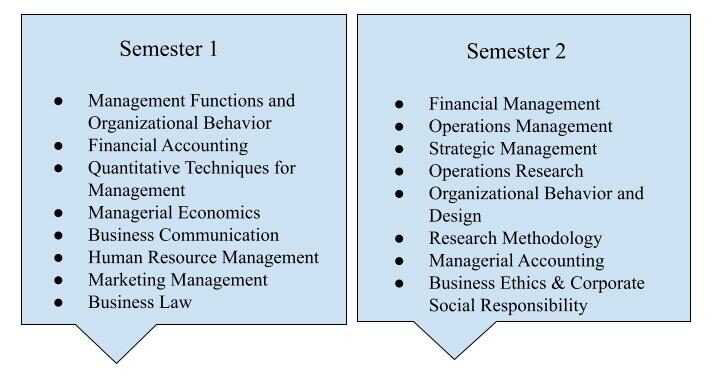
MBA 2nd Year Subjects With Specializations
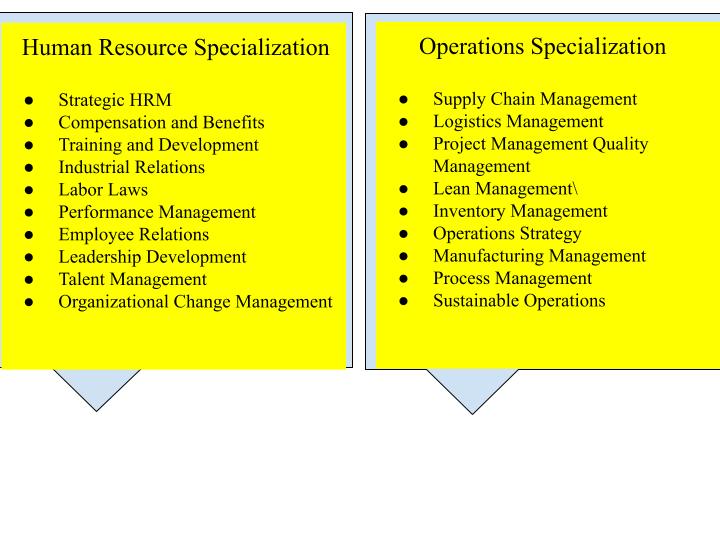
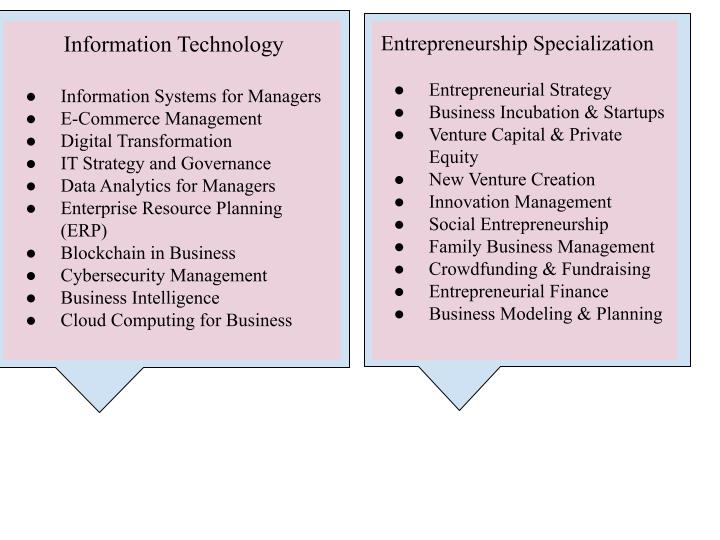
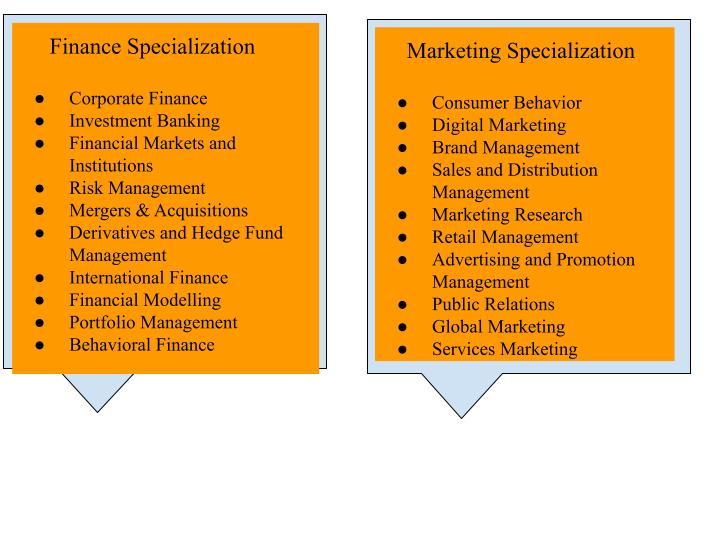
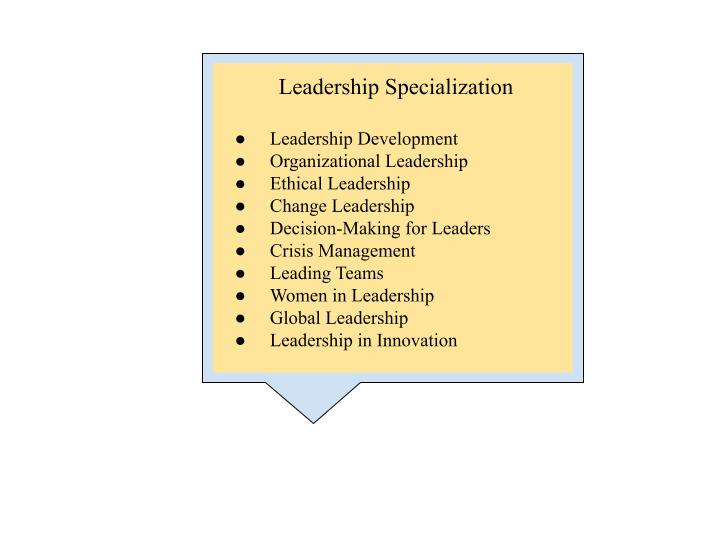
Additional Electives | Business Analytics, Data Science, Sustainable Business Practices, Healthcare Management, Green Marketing, Crisis Communication |
Indeed, the MBA program offers the necessary tools and knowledge for effective decision-making in business, organization growth, and leading successful people by focusing your concentration on finance, marketing, or leadership.
Elective vs Core Subjects: Key Differences
Are you ready to unlock the secrets an MBA subjects in India? Whether you’re just starting on your MBA journey or are in the process of Finalizing the one to chase in subjects, you should aim at the key differences between core and elective subjects.
What subjects are mandatory for MBA students to take?
1. Core Courses
Core courses are required instructional courses that teach basic business principles. They constitute the foundation of knowledge necessary for all MBA students to excel in leading various entities, irrespective of specialization.
Core MBA Subject Examples:
Management, Organization Behavior, Financial Accounting, Business Communication, Marketing Management, Strategic Management, Operations Management, Managerial Economics, Business Law, and Administration.
2. Elective Courses
Subject electives are valuable courses that help one major in certain business administration areas that might resonate with desired careers. About expertise unique to particular MBA subjects, students can utilize increased capacities as experts in MBA specialization subjects chosen by the students.
Examples of Elective Subjects:
- Finance
- Marketing
- Human Resources
- Operations
- Entrepreneurship
- IT
Elective vs Core Subjects: Key Differences
1. Know the Online MBA Curriculum at Manipal University, Jaipur
Manipal University creates its online MBA program to shape a strong foundation in Business Management. In the first year of one’s MBA subjects, participants will study core MBA subjects list that range in interest and scope but are compulsory and prescriptively provide an understanding of all concepts related to the business; an all-around knowledge instead of the chosen specialization.
2. Understand Career Goals and Interests
Before diving into MBA subjects, take time to reflect on your ultimate career objective. What industry do you want to work in? What role and responsibilities do you see yourself thriving in?
- If you enjoy analyzing numbers and making sense of financial data, Finance could be the right specialization for you.
- If brainstorming strategies, connecting with clients, and envisioning brand growth excite you, Marketing or Brand Management might be your perfect fit.
- If managing people, navigating employment laws, and handling talent management issues are areas that spark your interest, an HR specialization could be the path for you.
3. Differentiate the Choices of Elective Subjects at Manipal
All core subjects ought to have been considered already. Meanwhile, an exhaustive list of varied electives will be pending, just to suit the different kinds of specialization for a learner. Students often browse through the list to find something good that resonates well with their career interests.
4. Go to the Faculty members and Career Counselors
The online MBA at Manipal University offers a wide choice of specializations with practical course modules and regular interactive sessions with Guest Speakers and other Industry Leaders, Personalized Career Guidance Support, among many more. You may contact Jaro Education for details leading to this program. At Manipal University the faculty members, student mentors, and career counselors have a lot of solutions to help students in making well-informed decisions.
Closing Remark
-
- Which MBA specialization excites you the most?
- Finance
- Marketing
- Operations
- Entrepreneurship
- Which MBA specialization excites you the most?
Frequently Asked Questions
Yes, many MBA programs in India, including those offered by top business schools like IIMs and XLRI, allow students to change their specialization after completing the core subjects in the first year. However, this depends on the policies of the specific institution, so it’s advisable to check with your academic advisor for details.
While the core subjects of an MBA program are similar worldwide (business strategy, finance, marketing, etc.), there are key differences:
-
- Global Exposure: MBA programs abroad often offer more global exposure with a focus on international business, cross-cultural management, and global markets.
- Specialization Focus: Indian MBA programs may offer a more localized approach to business education, focusing on Indian market dynamics, while international programs often emphasize a broader global perspective.
- Curriculum Flexibility: Abroad, some MBA programs offer more flexibility with electives and specialized tracks based on industries and sectors, allowing students to tailor their education more closely to career aspirations.
The number of electives you need to choose depends on the duration and structure of the MBA program. Most MBA subjects list in India offer electives in the second year, and you may need to choose around 6-10 electives depending on your specialization. You can select electives based on your career goals and areas of interest.
Yes, MBA programs in India are increasingly designed to align with industry demands. Many business schools collaborate with industry experts, offer case studies, and include practical assignments and internships that help bridge the gap between theory and real-world business applications. Some MBA programs also offer specialized certifications in areas like Data Analytics, Digital Marketing, or Financial Modeling to ensure students acquire up-to-date, industry-relevant skills.
Yes, many MBA programs in India welcome students from diverse academic backgrounds, including engineering, science, arts, law, and social sciences. MBA subjects list are designed to provide foundational business knowledge and skills, so you do not necessarily need a business background. Core subjects in the first year cover basic concepts like accounting, economics, and management that are accessible to students from all fields.















